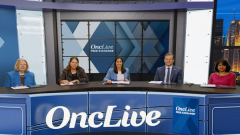
KEYNOTE-775: Lenvatinib Plus Pembrolizumab in Advanced Endometrial Cancer
The expert panel reviews the KEYNOTE-775 trial, which focused on lenvatinib and pembrolizumab in advanced endometrial cancer.
Episodes in this series

Transcript:
Ritu Salani, MD, MBA: I want to touch briefly on lenvatinib-pembrolizumab, presented in KEYNOTE-775. We got final updates. Tell us your takeaways, because that changed the game for recurrent endometrial cancer. How do you think these new studies are going to affect that? I’ll start with you, Ursula.
Ursula A. Matulonis, MD: The results of that trial, KEYNOTE-775, are embedded in how we take care of patients, at least those with mismatch repair–proficient recurrent or advanced endometrial cancer. That trial has been published in many forms. The New England Journal of Medicine article was the key 1. Patients with advanced endometrial cancer, both mismatch repair deficient and proficient, were given a combination of pembrolizumab-lenvatinib, with lenvatinib at 20 mg per day vs doctor’s choice of chemotherapy. That was weekly paclitaxel or doxorubicin, an agent that unfortunately is considered standard of care but that most of us don’t use at all. Across all the end points of that trial—overall response rate, progression-free survival, duration of response, and overall survival—all were in favor of pembrolizumab-lenvatinib.
The toxicity profile differed between the groups. There has been a lot of discussion about the toxicity profile being quite significant with lenvatinib-pembrolizumab. About two-thirds of patients who received lenvatinib arm had to dose reduce. With pembrolizumab, you don’t dose reduce—it’s straight 200 mg IV [intravenously] every 3 weeks. But with lenvatinib, two-thirds of patients had to dose reduce. The median dose in the New England Journal of Medicine paper was around 12.6 mg, and that’s become embedded. All of us probably use different lenvatinib starting doses. Matt alluded to the LEAP study. We’ve heard it’s probably going to report out this year. We’ll have to have another discussion about those results and how they’re going to fit in to our standard of care.
Ritu Salani, MD, MBA: Once again, it’s open to interpretation.
Shannon N. Westin, MD, MPH, FACOG: The other place where this is changing is that lenvatinib-pembrolizumab has been our standard of care in the second line. But if we’re moving immune checkpoint inhibition into the front line, we get into the question of, “Can we use checkpoint inhibition again?” That’s I/O [immuno-oncology] after I/O. Matt already mentioned the GY025 study, which is allowing prior I/O with a combination strategy. That will start to tease out some of that answer. That’s the next question: in a patient population that has gotten single-agent checkpoint inhibition, do we add lenvatinib at the time of progression? Will we see benefits there?
Bhavana Pothuri, MD: We need to do that study to get the data in terms of efficacy. Also, will providers want to continue immunotherapy and add a TKI [tyrosine kinase inhibitor] once they progress? We’ve got a few challenges there.
Ursula A. Matulonis, MD: Right. In KEYNOTE-775, the first class showed benefit across different histologic subtypes. But as we’ve talked about, we’ll be smarter about how best to treat these different histologic subtypes with their different molecular underpinnings. Even methylation status, estrogen receptor–positive status, β-catenin—all these factors will come into play. Patients will for sure do better and respond to treatments better, and hopefully we can minimize their toxicities.
Matthew A. Powell, MD: One thing I wanted to bring up was, we have a trial for early adjuvant, we have GY020, which is high- to intermediate-risk nonmetastatic patients, pembrolizumab vs observation. That study is crude and maturing. We’ll find those results. What wasn’t included in RUBY and GY018 is a lot of what we see. Those are node-positive stage IIIC1 patients who weren’t eligible for these trials because they didn’t have measurable disease. We thought they weren’t high enough risk to go on those studies. How do we treat those patients? Stage IIIC1 deficient or proficient adds another level of complexity. The majority of advanced-stage patients who come to our clinics weren’t eligible for RUBY and GY018.
Bhavana Pothuri, MD: We should get the data from GOG-3053 to help answer that because they were included in that [study]. Regardless, providers are going to extrapolate from the GY018 and RUBY data and treat those patients with immunotherapy. Hopefully we’ll see those data soon.
Ritu Salani, MD, MBA: At least with the mismatch repair–deficient [patients]. They’ll be pretty attractive in that population. With [mismatch repair] proficient, I'm not sure. I don’t know.
Ursula A. Matulonis, MD: I agree with you.
Transcript edited for clarity.





































